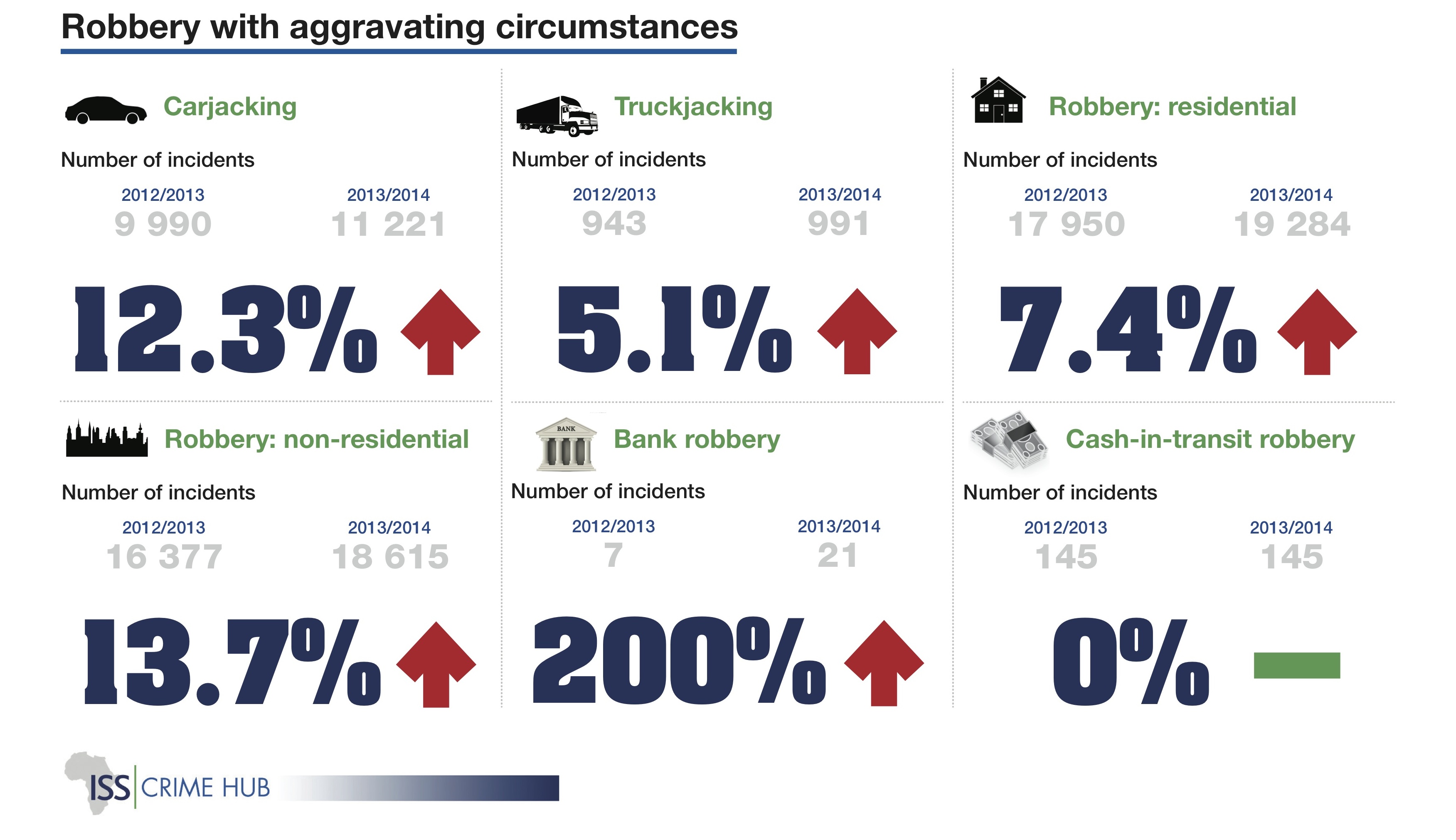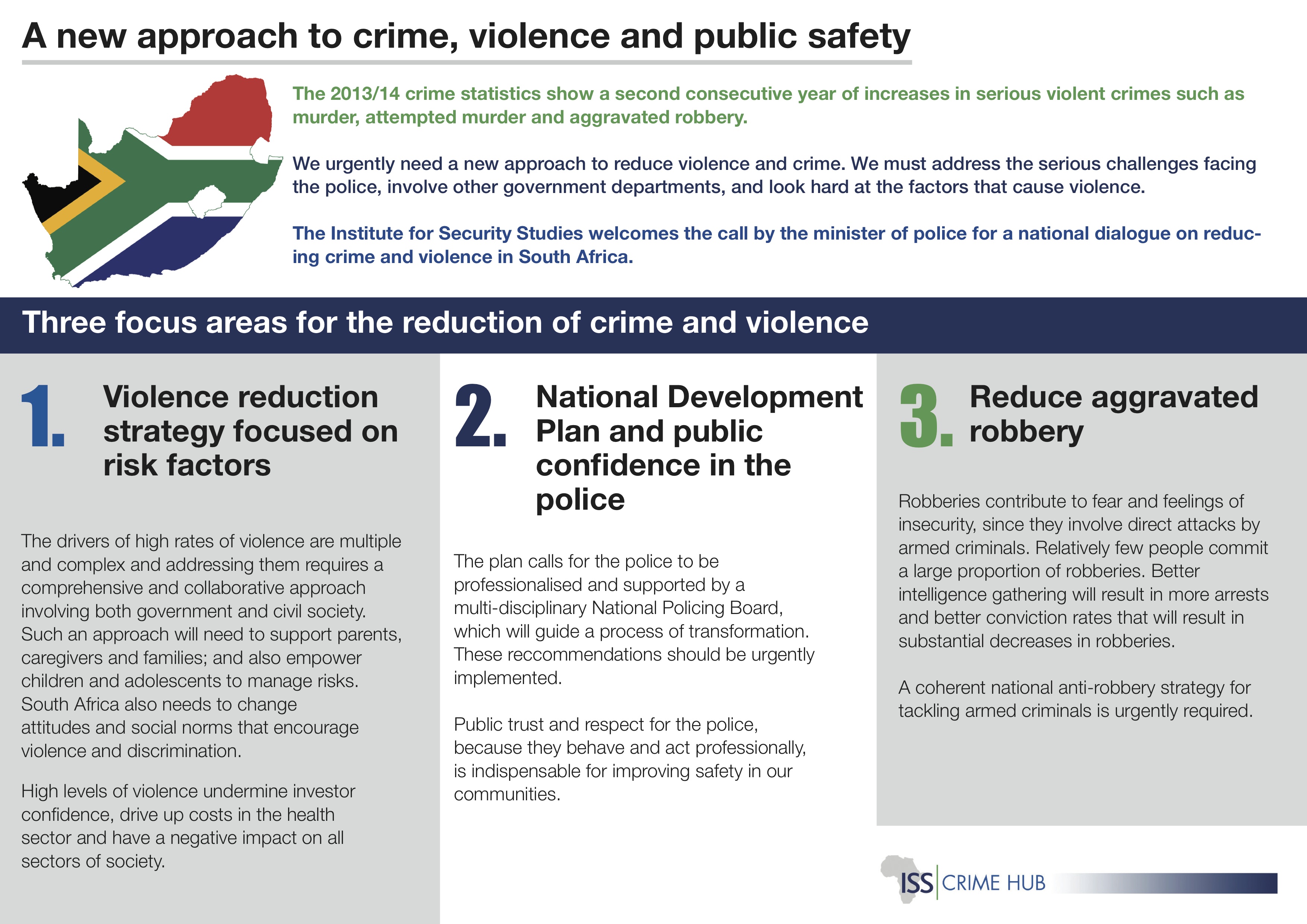South Africa urgently needs a new approach to crime, violence and public safety
Click here to access ISS Infographics on the Crime Statistics
Click here to access ISSAfricaTV videos on the Crime Statistics
Download the full crime stats fact sheet
The crime statistics released by the SA Police Service on Friday 19 September are a stark reminder of how far South Africa still has to go to reduce violence and crime, the Institute for Security Studies (ISS) said on Friday.
‘A second consecutive year of increases in serious violent crime such as murder, attempted murder and aggravated robbery are of particular concern to all South Africans,’ said Gareth Newham, head of the ISS Governance, Crime and Justice division.
'Murder is up by 5% with an additional 809 murders. Robbery increases are particularly concerning. Home robbery is up 7.4%, with 1 334 more cases than the previous year. Business robbery is up by 13.7% with 2 238 more attacks, and car hijacking is up by 12.3% with 1 231 more attacks than occurred the previous year.'
‘This shows that we urgently need a new approach to reduce violence and crime,’ Newham said. ‘We must address serious challenges facing the police, involve other government departments, and look hard at the factors which cause violence.’
The ISS welcomes the call by the Minister of Police for a national dialogue on reducing crime and violence in South Africa.
The ISS has identified three focus areas for the reduction of crime and violence:
Reduce aggravated robbery
The police need to focus on tackling aggravated robbery. Robberies create fear and feelings of insecurity because they involve direct attacks by armed criminals in the streets, in homes and at places of work.
Newham said the success of the 2009/10 Gauteng Aggravated Robbery Strategy showed the potential of the police to address this type of crime.
‘Gauteng’s intelligence-driven strategy coordinated the efforts of crime intelligence, visible policing, detectives and forensics to identify and arrest the criminals committing robberies and those who purchased the goods stolen in these attacks.’
Since relatively few people commit a large proportion of robberies, better arrest and conviction rates can result in substantial decreases in robberies, as was shown in Gauteng, although the strategy was abandoned once robberies started going down.
‘The continued increase in robbery means the police urgently need to focus on a coherent national anti-robbery strategy for tackling armed criminals,’ Newham said. ‘This will require the police to address the problems facing the crime intelligence division that have substantially reduced its productivity over the past two years.’
Implement the National Development Plan to improve public confidence in the police
The ISS welcomes the statement by the Minister of Police that the recommendations contained in the National Development Plan (NDP) adopted by the Cabinet in 2012 need to be implemented.
The NDP calls for the police to be professionalised and supported by a multi-sectoral and multi-disciplinary National Policing Board to guide a process of transformation. Professional policing means that all police know, understand and apply relevant procedures, rules and regulations; that they respond rapidly when crime occurs or is reported; conduct effective investigations, and treat all citizens with respect and dignity.
The NDP also requires senior police managers to be assessed against clear standards to determine whether they have the expertise, skills and integrity required for the posts they hold.
Senior researcher at the ISS, Dr Johan Burger, said this process would boost the confidence of senior managers who are working well, and deploy to other positions those who are out of their depth.
A new and dynamic team of senior SAPS managers, whose expertise, performance and integrity is beyond reproach, will be able to develop a detailed turn-around strategy and implementation plan for professionalising the SAPS, Burger said. This plan should be presented to the Minister of Police, Parliament and the public.
‘This will inspire public confidence in the police and improve the morale of those many dedicated officers who work under very difficult conditions.’
‘Increasing trust and respect from the public in the police, because they behave and act as trained professionals, is indispensable for improving safety in our communities,’ Burger said.
Develop a violence reduction strategy focused on risk factors
Violence is one of the most serious challenges facing South Africa, says ISS senior research fellow Dr Chandre Gould. ‘High levels of violence undermine investor confidence, drive up costs in the health sector and have a negative impact on all sectors of society.’
There are multiple and complex reasons for high rates of violence and these cannot be addressed only by the police or criminal justice sector. Reducing violence requires a multi-sector approach and adopting strategies identified by UNICEF as key to reducing violence against children, and thereby reducing violence in society.
‘We need to support parents, caregivers and families,’ Gould said. ‘There are effective evidence-based programmes that have been developed in South Africa and have shown improved bonding between caregivers and infants; and improved cognitive development of young children. We need to make these available to all parents in South Africa.’
‘We must also help children and adolescents to manage risks and challenges,’ adds Gould.
UNICEF has said that: ‘Giving children and adolescents the skills to cope and manage risks and challenges without the use of violence, and to seek appropriate support when violence does occur, is crucial for reducing violence in schools and communities.’
South African society also needs to change attitudes and social norms that encourage violence and discrimination, Gould said.
According to UNICEF: ‘Changing the attitudes and social norms that hide violence, such a bullying, domestic violence and corporal punishment, is the surest way to prevent violence from occurring in the first place.’
Reducing violence is possible, but it requires a comprehensive national plan; adequate resources and partnerships between the government and civil society, Gould said.
For media enquires only contact:
______________________________
ISS Infographics on the Crime Statistics

Click here to download the high resolution version

Click here to download the high resolution version

Click here to download the high resolution version

Click here to download the high resolution version
_____________________________
ISSAfricaTV Crime Stats 2014 Playlist

